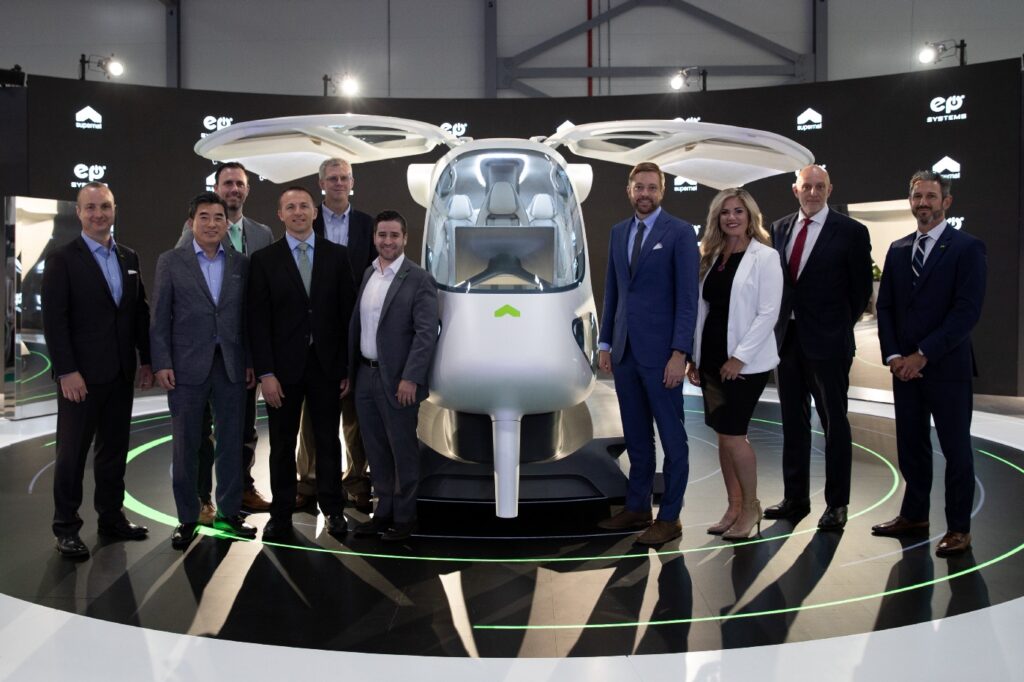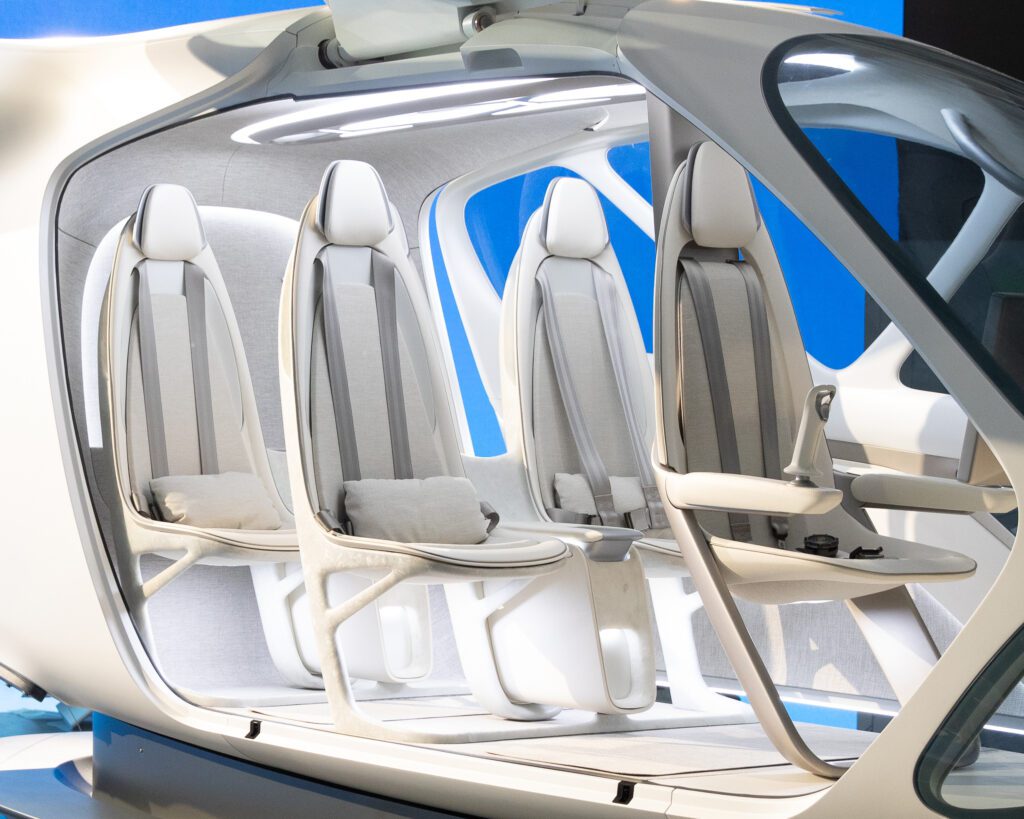Hyundai’s Supernal Establishes First eVTOL Development Partnership With EP Systems


Supernal has entered into its first vehicle partnership, with the company Electric Power Systems, for eVTOL battery development. (Photo: Supernal)
Hyundai Motor Group’s Supernal, an advanced air mobility company based in the U.S., recently announced its first vehicle partnership. Supernal and Electric Power Systems have agreed to work together in developing and producing lightweight batteries for electric vertical take-off and landing (eVTOL) aircraft.
The partnership, which was made official at the Farnborough International Airshow last week, was also formed to enable the introduction of commercial eVTOL flights. Supernal and EP Systems aim to support further enhancements of aircraft performance for the advanced air mobility (AAM) market.
Jaiwon Shin, Supernal CEO and President of Hyundai Motor Group, commented on the new partnership with EPS, stating that the AAM industry “requires an expansive value chain and many aspects—from battery power to digital infrastructure and passenger experience—require improvements and cross-chain integration to enable progress.”
In addition to collaborating with partners in support of AAM value chain creation, Supernal has developed an eVTOL aircraft concept, which was on display at the Farnborough International Airshow.

Supernal displayed its eVTOL aircraft concept at the Farnborough International Airshow. (Photo: Supernal)
Supernal aims to achieve certification for commercial operations of its eVTOL by 2028. The eVTOL concept designed by Supernal’s team offers five seats and prioritizes a low vehicle weight along with overall safety and a comfortable interior.
Supernal’s new partner, EP Systems, develops electric propulsion systems for a variety of industries including aerospace, defense, automotive, and marine. NASA, the Federal Aviation Administration, Boeing, Bell Textron, Embraer, Safran, and Aura Aero are some of EP Systems’ current customers. EP Systems was also recently selected to develop and manufacture the battery system for SkyDrive’s SD-05 air taxi.
EPiC Power is one of the solutions available from EP Systems—a 180Wh/kg lithium-ion battery system designed for eVTOL and hybrid aircraft. Another solution is the EPiC Energy system, with an energy density of 205Wh/kg. That system is tailored for use in all-electric aircraft, including eVTOLs.
Through its partnership with Supernal, EP Systems aims to support technological advancements that enable broad adoption of eVTOL aircraft, according to the company’s Chief Technology Officer, Michael Armstrong. “The requirements for the battery system of an eVTOL vary based on the design of the vehicle,” he said during an interview with Avionics International. “For some vehicles, the power requirements are very high because of the way they’ve designed the vehicle, while others may be a bit lower.”
The approach that EP Systems uses is developing a solution that meets the requirements of as many platforms as possible, Armstrong explained. “They all need cycle life, and they also all need energy density. The longer a battery can stay on the aircraft—the maximum number of flights it can perform—is extremely important.”

Increased cycle life and high energy density are two important factors for designing batteries to power eVTOL aircraft. (Photo: Supernal)
Now that eVTOL developers have demonstrated the viability of the concept, and proven that these kinds of aircraft can fly, the focus has shifted to economics and lowering the cost of ownership. One of the most effective ways to accomplish this is extending the cycle life of the batteries.
The other objective is improving energy density in batteries for eVTOL aircraft. The team at EP Systems expects that the energy density of their batteries will improve rapidly. “We’re looking at transitioning to cells within the next few years that get up to 350Wh/kg, which brings module energy density up to the mid- to upper-200s range at the fully packaged level,” Armstrong said.
“Some eVTOLs really unlock their potential when we get to 400+ watt-hours per kilogram at the cell level. We’re still a few years away from that, but we’re making steady progress towards it.”
Once commercial eVTOL operations begin, it will be vital to charge the aircraft quickly while maintaining or increasing cycle life. EP Systems is “developing technologies to unlock fast charging potential, and at the same time not lose cycle life,” Armstrong noted. “Our batteries can be charged for turnaround times of about 20–30 minutes, from a long-range mission perspective.”
He also mentioned another solution developed by EP Systems that will benefit eVTOL operations: a mobile microgrid truck. This vehicle will enable charging of electric aircraft at airports. It’s an ideal solution for airports that are not able to establish in-ground charging infrastructure immediately. Instead of setting up a permanent charging station, the microgrid truck will be able to move to where the aircraft is. It could enable eVTOL operators to quickly adopt the technology regardless of infrastructure-related constraints.
EP Systems also had their mobile microgrid truck on display at this week’s EAA AirVenture Oshkosh airshow in Wisconsin.
“The mobile microgrid acts as a corollary to the fuel truck. It provides energy at the point of charge,” Armstrong explained. Setting up in-ground infrastructure can be both difficult and expensive. The batteries integrated onto the truck could be charged at or outside the airport as needed. This concept was developed to leverage use of batteries that can no longer be used on the aircraft itself. The mobile microgrid lowers energy costs and maximizes the value of older batteries that are still functioning.
The post Hyundai’s Supernal Establishes First eVTOL Development Partnership With EP Systems appeared first on Aviation Today.
—————
Boost Internet Speed–
Free Business Hosting–
Free Email Account–
Dropcatch–
Free Secure Email–
Secure Email–
Cheap VOIP Calls–
Free Hosting–
Boost Inflight Wifi–
Premium Domains–
Free Domains





